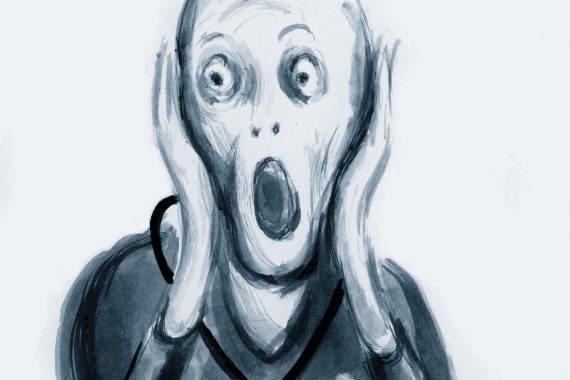The benign thingy is completely irrelative

‘So, doctor,’ he says, waving his copy of the consultant’s letter from his latest outpatient attendance, ‘What exactly is a lesion?’
Time was when I’d have found the ensuing consultation an annoying waste of my precious time. But not now. It suits my mood entirely. I’ve always been idiosyncratic, jaded and cantankerous. But these characteristics are no longer seen as character flaws; they’re written into the job description of getting older.
So it is that, currently, I’d rather have a consultation focusing on linguistics than on, say, an itchy bottom, hacking cough or discharging nipple – it suits my current grumpy obsession on the abuse of the English language. I am turning into the type of person who joins the Apostrophe Protection Society. Last night I found myself swearing at a sign at my local gym stating, ‘The use of razors in the showers are prohibited’. And recently I had to turn off the radio when I heard a lower league scouse football manager, annoyed at his interviewer’s question, aggressively mangle ‘irrelevant’ into ‘irrelative’. ‘That’s irrelative,’ he said. And, in case we were in any doubt, ‘Completely irrelative.’
But, still, ‘lesion’. That’s a tough one. Doubtless you’ve been in this situation, too. Medicolinguists have long argued that ‘lesion’ is the one word in the medical lexicon that actually defies definition. But they are wrong. Because, as you will see, I have managed it.
‘Doctor?’ he repeats, snapping me out of my reverie. ‘So this lesion on my chest X-ray? What does it mean?’
I take a deep breath. ‘Basically,’ I say, ‘A lesion is….a thing. Or, more accurately, given that ”thing” sounds concrete and probably serious, and a lesion may turn out to be neither, a ”thingy”.’
‘A thingy?’
‘Yes. Except there’s debate about whether it should be reserved for thingies which are definitely things, or should encompass artefacts, too, which are things which appear to be thingies, but aren’t. So, to be precise, I’d say a lesion is a thing-like thingy.’
‘But it says here,’ he continues, indicating the letter, ‘that this is only a possible lesion.’
‘In which case, it’s only possibly a thing-like thingy.’
‘So what else could it be?’
‘Well, it could be nothing.’
‘Yes?’
‘Or it could be something.’
‘So a lesion, doctor,’ he says, slowly, ‘Is a possible thing-like thingy which could be something or could be nothing?’
‘That’s it exactly,’ I say, with a sense of triumph and closure. And that’s my definition. Please feel free to borrow it next time you’re in this situation.
He stands to leave, but pauses.
‘There’s just one more thing,’ he says.
‘Thing, or lesion?’
‘Thing,’ he replies, then looks at the letter again. ‘What is….”functional abdominal pain”?’
‘That’s irrelative,’ I say.
Pulse October survey
Take our July 2025 survey to potentially win £1.000 worth of tokens











